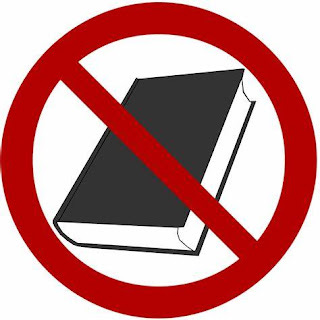Illinois is aiming the first state to "ban book bans" by passing a new bill;.
It's a bad idea.
I get that it means well. And at least the bill's authors leaned on the work of the American Library Association's Library Bill of Rights, rather than concoct something from scratch on their own.
Nevertheless, if I were a legislator contemplating HB 2789, I'd have to say no. Here's the pertinent language from the bill:
In order to be eligible for State grants, a library or library system shall adopt the American Library Association's Library Bill of Rights that indicates materials should not be proscribed or removed because of partisan or doctrinal disapproval or, in the alternative, develop a written statement prohibiting the practice of banning books or other materials within the library or library system.
I have several issues here.
First, all libraries have to make choices, because all libraries have limited space. All libraries make choices about which books not to acquire, which books not to give a slice of the valuable and limited shelf space in the library.
So libraries are going to say "no" to certain books. This language invites folks to imagine what the motivation for the book's rejection might have been. I'm betting that one of the most common reasons to not procure a book is "we didn't think of a good reason TO purchase a copy," which just starts an argument in which I say, well the reason I think you should have that book is a political one, so if you didn't see that reason, that's a sign of political bias on your part. And on and on--we can run in circles all day because ultimately this hinges on what is in the hearts of the librarians making the decision.
I'm betting this bill is aimed mostly at library boards that might have been "captured" by the anti-reading folks. However--
Second, legislators do this thing where they imagine how a certain legal tool could be used by their team while failing to anticipate what it would look like in the hands of other teams. So some folks may be imagining that this bill could be used to thwart boards that want to block any LGBTQ penguin books; however, it would be equally useful in thwarting a librarian who had objections to stocking books from Aryan Pride Publishers.
Okay, so I think those are real concerns, but I also suspect that--
Third, this results in one of those policy policies. The library board adopts a policy so that they can check that box on the paperwork for the state, and then they go back to conducting business as usual while the policy languishes in the dusty volume of policies and procedures.
So what should be done?
The best policy for managing a well-curated library collection is two steps:
Step 1) Hire trustworthy people and let them do their jobs.
Step 2) Because reasonable people can disagree about suitability of some resources, have a formal procedure in place for challenging library contents.
That's definitely a better process than the one currently be used in far too many public school libraries these days, which consists of this conversation:
One angry adult: I am angry that [copy and paste book title from activist's list] is in the library. You'd better fix that right now, because I'm upset.
Spineless administrator: Eeek! (Runs off to get rid of offending book.)
I have little faith that we can legislate our way into equitable and free access to a wide and wonderful bunch of reading in a library. Trying to rewrite the rules so that they reflect every nuance and detail of your own personal moral code is not, as the forces of reactionary culture panic are now demonstrating, useful or healthy. Better to speak up, en mass, and let the library board know where you stand. The ideal scenario remains this one--
Library patron: Oh, I don't think I agree with what's in this book. (Walks on by and doesn't check that book out.)
But until we get there--well, I get saying "This is 2023 and we shouldn't have to be fighting people who want to ban books," but here we are. We can't pick the times we live in, and we can't ignore them, either. Stand up, speak out-- many times, if necessary. Listening is also helpful--short of the radical extremes, there's a lot of room for disagreement on this topic. But trying to legislate what librarians must have in their hearts and minds as they try to do their job--that's not the way.





Really insightful, thank you for this.
Very interesting and insightful. Thanks